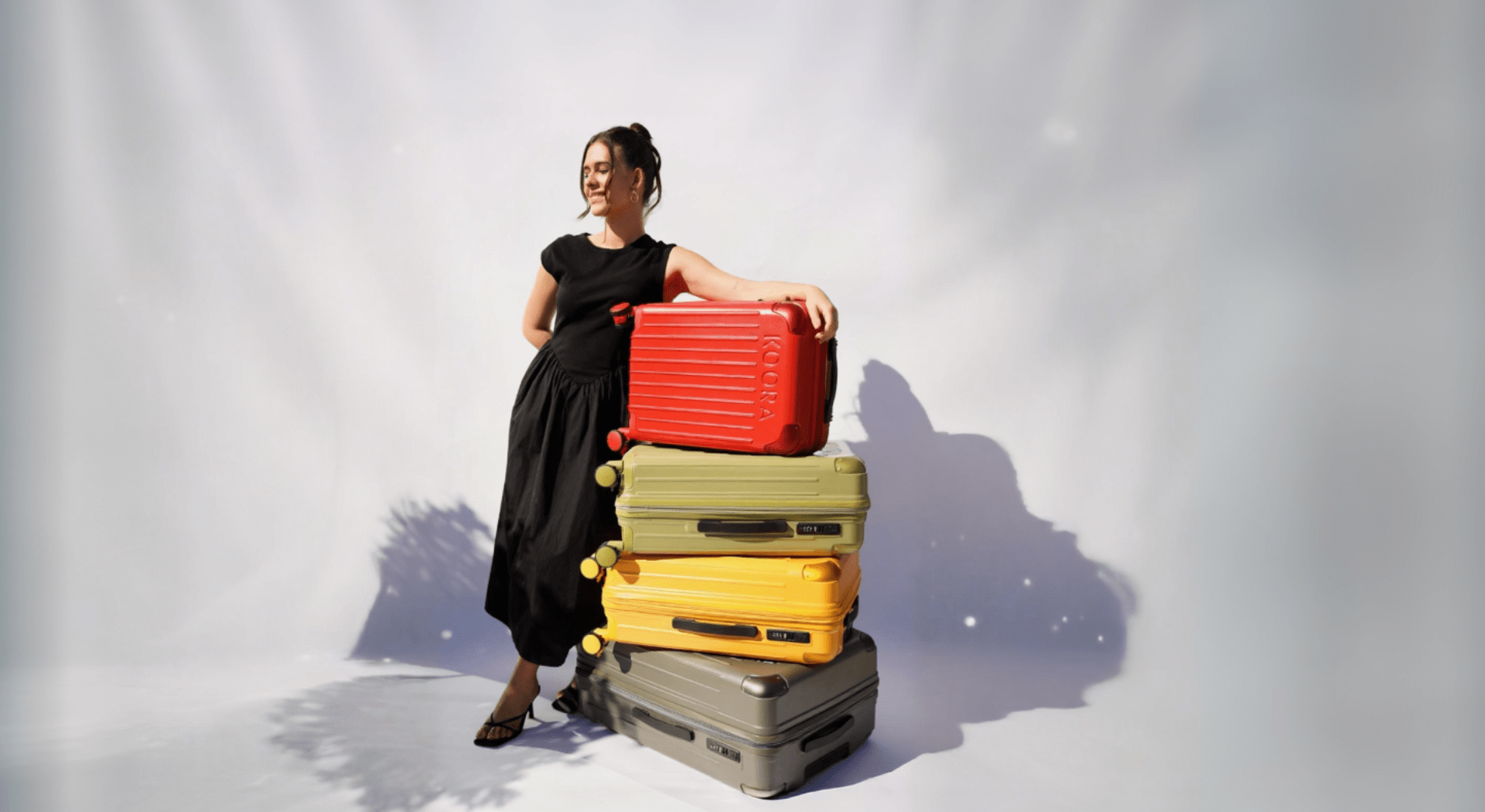
How to Repair vs. Replace Your Luggage Sustainably
Travel not only alters you but also your luggage. Each trip (be it a short weekend trip or a lengthy adventure trip) finds its way to leave behind its scuffs, scratches, and tales. However, when your suitcase or your backpack starts wearing seriously, then the question arises: Which to do, repair or replace?

This choice cannot only be viewed through the prism of its cost-effectiveness but that of its sustainability, especially nowadays when issues of climate change and overconsumption are burning questions. The question is, how can we make that choice more responsibly and how companies such as Koora enable travellers to get more sustainability out of their luggage instead.
Why Sustainable Choices Matter in Luggage Care
Most of these bags are made of a mix of materials, including polycarbonate, Aluminium, steel, fabrics and zippers; they cannot be recycled. The act of disposing of an old suitcase most of the time implies placing the suitcase into the landfill and probably leaving it to decompose after many years.
Repairing, as opposed to replacing, would mean less waste, no resource utilisation and a smaller environmental footprint of a newly made bag. But sometimes wanting to retain the item becomes infeasible; knowing when to stop is an essential part of sustainable decision-making.
Step 1: Assess the Damage
Before you decide, take a close look at the problem:
-
Minor Wear and Tear: Scratches on the surface, missing zipper pulls, scuffed up corners and loose wheels are usually easy to repair.
-
Structure Problems: Having a cracked hard shell, a broken frame, or indeed a totally rented fabric may need special repairing, and replacing it can in some instances be cheaper.
-
The Issues of Functionality: You need to be able to roll, carry or lock the luggage you are using, so until it is fixed, you can not travel with it.
A quick self-inspection can help determine whether you need professional help or a simple DIY fix.
Step 2: Repair — The Eco-Friendly First Choice
If your luggage still has a good frame and decent material integrity, repair is almost always the greener choice. Here’s how to do it sustainably:
1. DIY Fixes
Some repairs require minimal skill and can be done at home:
-
Replacing wheels (many online tutorials are available)
-
Installing a new handle grip
-
Fixing loose screws and bolts
-
Cleaning and re-lubricating zippers
Pro tip: Many luggage brands, including Koora, design their bags with modular components that make swapping out wheels or handles much easier.
2. Local Repair Shops
Supporting local repair businesses not only keeps your bag out of the landfill but also reduces shipping-related emissions. Many shoe repair shops also handle luggage.
3. Brand Repair Programs
Some premium and sustainable brands offer in-house repair services or partnerships with local fixers. Koora, for example, is working towards an extended repair support model that encourages customers to send their luggage in for professional restoration instead of replacing it prematurely.
Step 3: When Replacement Becomes the Better Option
No matter how eco-conscious we are, some luggage reaches a point where repairs would cost more than buying a sustainable replacement. Here’s when to consider a new purchase:
-
Safety Concerns: Broken locks or severely cracked shells that compromise the security of your belongings.
-
Multiple Failures: If wheels, zippers, and handles all fail within a short period, it may indicate material fatigue.
-
Travel Demands Have Changed: If you now travel long distances or fly frequently, your needs might require a sturdier design.
When replacing, focus on buying better, not more — invest in luggage designed to last for years.
Step 4: Choosing a Sustainable Replacement
If repair is off the table, your next move is crucial for minimising your environmental impact. Look for:
-
Recycled/ Upcycled Materials- Brands such as Koora employ high-quality hard shells designed to be durable so as to avoid easy bending or cracking in adverse conditions. Other brands use materials made of recycled plastic from the ocean or post-consumer waste.
-
Repairable Design- Adjustable parts, easy-to-open screws, and detachable elements make future repair possible.
-
Ethical Manufacturing -The factories with reputable labour conditions and environmentally friendly practices.
-
Warranties and Fixing Solutions-Nothing demonstrates confidence and interest in the brand and product durability than a long warranty.
When you spend cash on luggage well built and made ethically, you end up replacing it less, and it saves your pocket tons and the planet even more.
Step 5: Dispose of Old Luggage Responsibly
If you do replace your suitcase, resist the urge to leave the old one on the curb. Try these eco-friendly disposal methods:
-
Donate: If it’s still functional, donate it to local charities, schools, or shelters.
-
Upcycle: Turn it into home storage — a quirky coffee table with storage space inside, or a craft supply organiser.
-
Recycle: Check if your local recycling centre accepts mixed-material goods.
-
Brand Take-Back Programs: Some brands offer store credit for returning old luggage for recycling.
Koora’s Perspective on Repair vs. Replace
The concept of sustainability is not only a buzzword at Koora but also a key to the way we design all hard-shell suitcases. We have a simple philosophy: to build to last and then to design in order to repair it.
Kora is not about pursuing the next fad or focusing on quickly disposable luggage, but sustainable products to last the test of time with minimal waste. All parts - zippers to wheels—are selected for strength and simplicity to replace. The goal? Let a Koora bag accompany you on as many trips as you can take to decrease the amount of waste that will end up in landfills and to consume consciously.
In situations where repairs are required, Koora strives to streamline the experience as much as possible to make repairs as easy and accessible as possible, with the aim of having an international repair support network, thus travellers can easily increase the life of their bag without any stress.
Expert Advice for a Greener Travel Gear Mindset
-
Think long-term at purchase: If you buy quality from the start, you’ll repair less often and replace far less frequently.
-
Learn basic fixes: A simple screwdriver and a few spare parts can save a bag from the dump.
-
Avoid impulse buying: New colours or styles are tempting, but sustainability means resisting unnecessary upgrades.
-
Travel lighter: The less strain you put on your luggage, the longer it lasts.
Final Thoughts
It is not only about saving money when not replacing your luggage, but also about saving the world. The loose wheel, a stiff zipper or a fraying seam do not mean that the route is over in many cases. That is an opportunity to keep it rolling, flying and adventuring in future years.
Repair is not always possible, so to make sure your travelling companion is as dedicated to the task as you are, swap your bag with a more sustainable and kangaroo-friendly option like the hard-shell range available at Koora to give your bag a second life that will not only last, but be greener than ever.
Therefore, the next time you get your suitcase in a beat-up state, stop and think before throwing it out. Given some extra attention and the conscious mind, your suitcase could be much more travelled.



Leave a comment
This site is protected by hCaptcha and the hCaptcha Privacy Policy and Terms of Service apply.